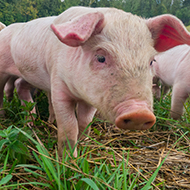UK pig farm carbon footprint shows significant decline

Animal feeed was found to be central to the environmental impact of pig farms.
A study by Queen's University Belfast has revealed a 40 per cent decline in the carbon footprint of British pig farms.
The study, published in the journal Agricultural Systems, reviewed data on the carbon footprint of English, Scottish and Welsh pig farms over the last 20 years.
Animal feed was found to be central to the environmental impact of pig farms, accounting for between 75-80 per cent of carbon footprint.
It suggests that changes to feed ingredients could alter the carbon rating of pig farms and the industry as a whole. Specifically, researchers suggest replacing soya imported from South America with home-grown crops such as rapeseed and sunflower meal.
Soya has a high environmental footprint associated with deforestation. But researchers found the increasing trend of replacing soya with home-grown feed had a 'significant mitigating effect' on carbon emissions.
The study also reveals that advances in animal nutrition had a beneficial effect on carbon emissions - particularly the increased availability of synthetic amino acids and enzymes, the price of which decreased over the study period.
When added to domestic feedstuffs like rapeseed, these supplementary ingredients increased nutrient availability and improved feed balance. They reduced nutrient excretion in manure while boosting animal productivity by 30 per cent.
Moreover, the study found that such supplements in animal feed helped lower phosphorus levels in run-off from pig manure by more than 20 per cent, reducing the contribution of pig systems to freshwater pollution.
Study leader Professor Ilias Kyriazakis from Queen's Institute for Global Food Security said: “The reason this research is so significant is that it shows an area of livestock farming where carbon footprint has been reducing over the past 20 years, almost ‘under the radar’.
“We hear a lot these days about the need for farmers to reduce their carbon outputs for the sake of the environment, especially as it applies to beef and dairy cattle farming. There is much more attention focussed on ruminant food systems as they produce higher GHG emissions.
“But I believe there are important lessons to be learned from this study – not only for better environmental management as it relates to pig farming, but potentially for all livestock systems. Some of the improvements identified in this study could potentially be applied to other animal systems, which would ultimately help move our collective agriculture systems towards a carbon-neutral model.”



 The RCVS has announced a new version of its 1CPD mobile app, with enhanced features for veterinary surgeons and veterinary nurses to record their continuing professional development.
The RCVS has announced a new version of its 1CPD mobile app, with enhanced features for veterinary surgeons and veterinary nurses to record their continuing professional development.